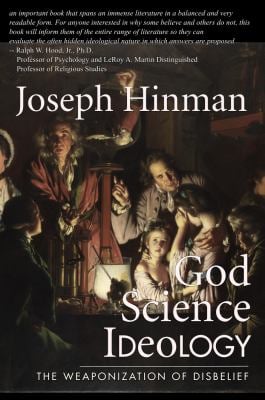This is a review of the book from Philosophy in Review Vol. 42 no. 2 (May 2022).
Joseph Hinman. God Science Ideology: Examining the Role of Ideology in the Religious-Scientific
Dialogue. Grand Viaduct 2022. 647 pp. $59.99 USD (Hardcover ISBN 9780982408766).
If any area of current philosophy is so incendiary as to teeter on violence, it is argument about an
omnipotent divine being’s existence. The ‘debate’—too gentle a term here—becomes so vehement
it echoes the doctrinal tree-shaking that led to so many religious wars. Certainly, professional
philosophers tend toward protocols of respect and charitability among one another. But the internet
has provided history perhaps the most immense battlefield for doctrinal dispute. Hinman’s lengthy,
vehement, if generally sober offering to this battle is almost definitive of the field.
It is likely one
of the most thorough religious apologetics in contemporary times. It merits a serious consideration
and is certain to draw some rabid fire.
A quick thumbing through blogs, blog comments, message boards, and chat rooms reveals
an astonishing, if not unsettling, anger, and even hatred. After centuries of highly Christianized
Western philosophy, upon the advent of Darwin/Wallace theory, sides quickly started forming.
While ancient Greece tolerated few atheists, such outlook had only shaky grounds until 1859: a
magnificently cogent theory of life’s origins and development required no ultimate mover. It seems
the religious have since then taken up arms, both metaphorically and, in the case of World Trade
Center and its imitators, literally. In turn, growing atheist movements reacted against such
defensive measures. For reasons beyond this review’s scope, this upsurge in side-taking and
regrouping, like so many buffalo facing predators, evidences a powerful human need for settling
the issue, pace the few agnostics gazing on bewildered. A peek at the arguments reveals a mess.
One of the advantages of Hinman’s new work is that it attempts, among other goals, to order the
mess somehow.
While he is professedly theistic, the work exudes care and some respect for the various
perspectives. Its sheer breadth and depth of scholarship and capacity in articulating it attests the
generally due respect of the many sides, which often exhibit the rational and irrational in one
commentator. The central theme, which ties the various sub-arguments together, is that ideologies
outside of the sciences themselves are informing science-based, evidential arguments about divine
existence. Many sides of the debate, including the monotheistic, are equally guilty.
Hinman’s ideology-scorning approach, in the end, exerts notable force and a new voice in
the controversy. His book has brought together many positions in the debate. Hinman’s most
persistent targets are the contemporary theories maintaining that a divine’s existence can be
decided solely by scientific theories. Most thinkers, except possibly extreme agnostics, seem to
harbor ideologies. Perhaps ideologies have their place somewhere in the life of the mind. That
caveat, and whatever place ideologies may hold, are not the point here. Rather, it is that too many
researchers in this area either do not admit their own ideology or deny its importance to the
discussion of divine existence. Hinman details how many a contribution to the discussion is steeped
in ideology, without their authors’ acknowledging—or even seeing—it. Only by bringing these
ideologies explicitly into the discussion can it gain significant traction to get the discussion out of
the mud.
see the rest: https://philpapers.org/archive/MILJHG.pdf
Copyright: © 2022 by the author. License University of Victoria. This is an open access article distributed under the terms and 22
conditions of the Creative Commons Attribution-NonCommercial license 4.0 (CC BY-NC) https://creativecommons.org/licenses/by-nc/4.0/
